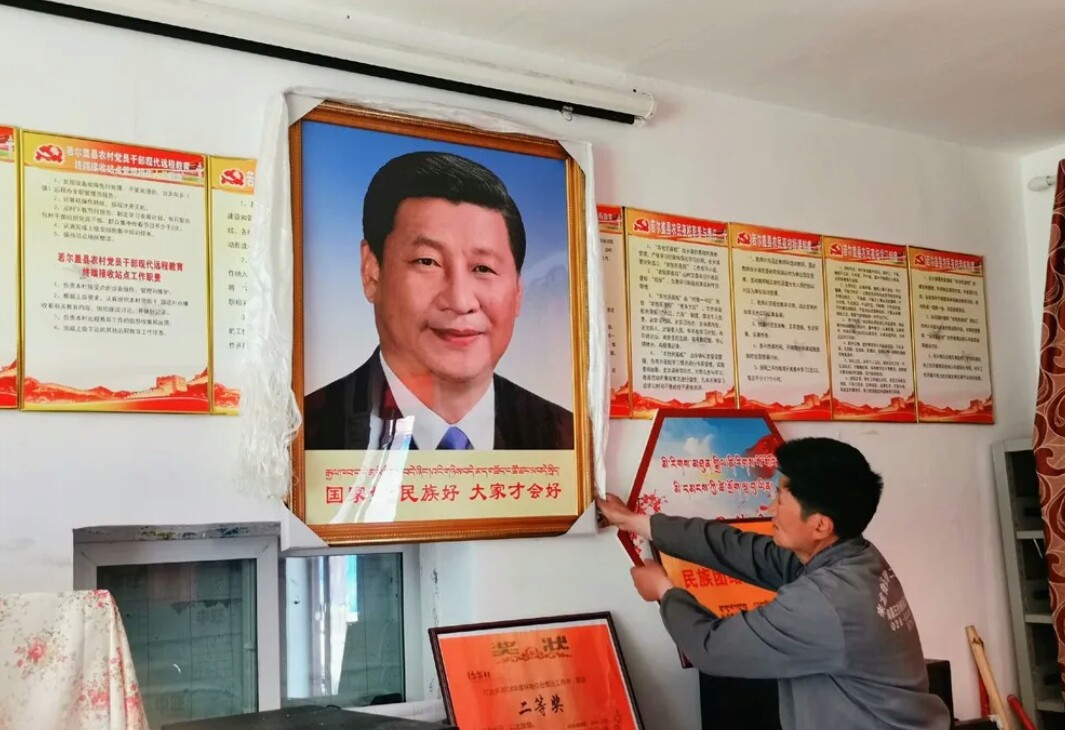Tibetans are being forced to display pictures of Xi Jinping and other Chinese Communist Party (CCP) leaders in their homes, according to human rights campaigners.
The policy was previously only compulsory for Tibetan families dependent on state support under a poverty programme but has now been extended to the wider community, according to reports from the area.
Critics have condemned the move and accused China of adopting a more “aggressive” approach to Tibet since Xi Jinping became its leader. There are allegations of increased surveillance by China and programmes aimed at “indoctrinating” Tibetans.
Images obtained by Tibet Watch show the distribution of framed images of Xi Jinping in Dzoge County in eastern Tibet. An estimated 14,000 images have been distributed across the county, campaigners claim.
According to the human rights group, authorities in the region said that people should “remember the gratitude of the party and in the spirit of following the party, all households, monasteries, schools and offices must display the portrait of top party leaders”.
The group said that villagers in Tibet were assembled and images of party leaders handed out for people to hang inside their homes.
Images were also distributed to schools, monasteries and offices and the authorities are reportedly inspecting households to check whether the order has been carried out.
The programme began in Tibet around the start of this year and the pictures were taken in the first week of April.
Since 2012, various programmes have been launched by the CCP to ensure loyalty and patriotism among Tibetans to the Chinese state.
Tibet Watch said: “Patriotic re-education, forced displays of loyalty to the party and the state, eradication of connections to the Dalai Lama and such similar efforts have been relentless in Tibet. The main objective of this current programme is to transfer the reverence and loyalty that Tibetans have for the Dalai Lama and the Buddhist religion to the CCP leaders.
“There have been numerous reports where Tibetans continuously holding loyalty and faith to the Dalai Lama or deviating from the CCP’s rules have been targeted or arrested by the authorities under these regulations.
Tibet Watch added: “Since the arrival of Xi Jinping in political leadership, the party’s approach to Tibetan has been more aggressive. This has been backed by ever-increasing surveillance alongside various programmes aimed to brainwash, indoctrinate and transform the loyalties of Tibetans.”
John Jones, from the campaign group, Free Tibet, said the measures “show contempt for Tibetans” and demonstrate the “worst characteristics of the Chinese Communist Party led by Xi Xinping”.
He added: “Beijing is extending its control into Tibetan homes and making it clear who their new leader is. However, loyalty that is demanded through the barrel of a gun is no loyalty at all.”
On 22 April it emerged that a Tibetan man was released from prison in eastern Tibet after serving five years for publicly supporting the Dalai Lama. Sonam Dhargyal from Ngaba County, which is governed as part of Sichuan Province, was released on 30 March and reported to be in normal health.
He was arrested in 2015 after attending a religious festival in Gomon Monastery, Ngaba County, with a flag and a picture of the Dalai Lama.
Tibetan language being replaced by Chinese, warn campaigners
In March we reported concerns aired by exiled Tibetans living in Scotland after a report revealed that children in rural areas of Tibet are being taught Chinese at the expense of their native language.
The report is called “China’s Bilingual Education Policy in Tibet – Tibetan-Medium Schooling Under Threat”. It says that China’s education policy in Tibet, also known as the Tibet Autonomous Region (TAR), is significantly reducing the access of ethnic Tibetans to education in their mother tongue.
China formally introduced a policy of “bilingual education” in 2010 for schools in all minority areas in China, an approach to minority education considered appropriate internationally when it promotes competency in both the local and the national language.
The official position of the regional authorities is that both the Tibetan and Chinese languages should be “promoted,” leaving individual schools to decide which language to make a priority as the teaching medium.
But, according to Human Rights Watch, those schools are increasingly staffed by non-Tibetan-speaking teachers and have virtually no Tibetan textbooks.
Human Rights Watch said: “Tibetans already endure pervasive restrictions on their rights to free speech and religious belief, political participation and cultural expression.
“Since China’s bilingual education policies were formally introduced in 2010, Tibetans have repeatedly protested against them, mostly in Qinghai province in northwestern China. They have also demonstrated virtually by publishing online letters and petitions.”
Since 1996, the United Nations has repeatedly expressed concern over China’s claims that the country is providing truly bilingual education.
The Chinese Embassy in London has been asked to comment.
Photo thanks to Tibet Watch.














